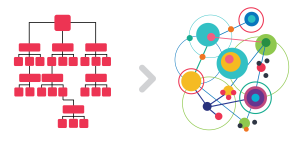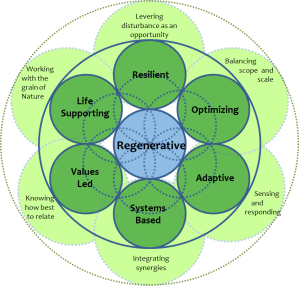Phoenix Rising…the time has come
Out of the current volatility and uncertainty emerges a new way of doing business
Today we find ourselves called to operate amid increasing complexity, volatility and system stresses. What lies ahead for our leaders, managers and entrepreneurs is an increasing proliferation of ‘non-normative’ ruptures across our interwoven socio-economic, corporate and political operating system: burgeoning debt crises, fragile world economies, volatile stock markets, vulnerable global supply chains, increasing stakeholder tensions, widening socio-economic disparity, climate change, refugee crises, disruptive technologies, increasing ecological challenges, are just some of the inter-related issues heralding a new way of doing business.
As Director of the Institute of Statecraft, Chris Donnelly notes the rate of change we are now going through is comparable to what happens in war time; Executive Chairman of the World Economic Forum, Klaus Schwab, echoes this by noting that we live in a time of great promise and peril, a time of simultaneous breakdown and breakthrough.
Put simply, business-as-usual is no longer an option. And yet so many of our leaders and managers find themselves entangled in a business logic that keeps us inured in our business-as-usual mind-set, holding us back from placing the new steps of change so vitally needed for our organisations to become future-fit.
A recent report for 21st Century Statesmanship Global Leaders shows ‘executive myopia’ is endemic at senior management across business, government and the third sector: short-termism, reactive aversion and systemic fear, internalised focus on cost-cutting rather than out-of-the-box thinking, cognitive overload and dissonance, top-level reluctance blended with anxiety, frailties and fatigue. This report is by no means the exception, with its findings complimenting a range of research from across the globe, all contributing to a rich-picture of a widening and deepening ‘complexity gap’ as leaders hold on to an outdated logic while seas change. At a time when we need to courageously transform our ways of operating and organising, we find ourselves entrapped by the very logic that created our problems in the first place.
This is not to undermine a number of positive developments taking place on complex global leadership issues such as the UN Global Goals campaign and the COP21 agreements in Paris a couple of months ago, where a variety of non-political stakeholders helped secure a constructive outcome. Yet, the cold reality is the majority of our leaders – across government, corporate and non-profit institutions – are struggling to cope with current conditions. And things are only set to get yet more complex, uncertain and challenging. As the management guru Peter Drucker once famously noted, ‘In times of turmoil, the danger lies not in the turmoil itself but in facing it with yesterday’s logic.’
Yesterday’s Logic Future-Fit Logic
Extractive Regenerative
Mechanistic Living systems
Shareholder focus Multi-stakeholder
Maximise financial returns Maximise mission
Follow the money Guided by soul
For-profit For-purpose
Top-down control Emergent
Hierarchy & linearity Panarchy & networks
Exploitative relations Reciprocity
Contributes to systemic fragility Encourages resilience
Undermines the future for today Enhances wellbeing
Egoic operating system Soul-infused
Fear-based leading Courage-based leading
This age of uncertainty demands new ways of operating and organizing: distributed, networked, anti-fragile, flourishing firms of the future. This ‘new norm’ reaches well beyond orthodox organisational logic by seeding wholly new ways of doing and being. It is a liberating transformation which happens at all levels of our culture: from the everyday meeting protocols designed for control transforming into more collaborative methods such as hackathons, swarms and open space technology; to top-down control-based bureaucracy transforming into locally-attuned teams of people empowered to adapt to ever-changing conditions within their sphere of operation.
Enter a myriad of organisations thriving amid uncertainty by applying living-systems logic: the on-line retailer Zappos, the healthcare provider Buurtzorg, the bank Triodos, the employment agency Vaga, the chemicals manufacturer Scott Bader, the global network of social-enterprise community centres Impact Hub, the multimedia provider Sounds True, to name a few.
Running our organisations in more natural, more alive, more creative ways is not some futurist utopian vision, it’s happening now as you read this article. It’s gone mainstream, and we all ought begin to embrace it or we shall soon be yesterday’s news.
Gone with the winds of change is the artificial certainty and mechanistic linearity of command-and-control cultures and ‘human resource’ management, revealing a fresher, purposeful, altogether more human approach to our ways of working.
To aid this transformation, here are five important areas for leaders to focus on in these transformational times:
- Communication: to commune with others, really listen and share with our peers and stakeholders within and beyond the organisation by creating collaborative networks that do more than just brainstorm by having the remit to prototype the future.
- Innovation: within the organisation ‘accelerator skunkworks’, ‘incubators’ or ‘innovation hubs’ operate like cocoons in stealth mode (Google X, for instance) where bright out-of-the-box innovators across the organisation can engage in entrepreneurial explorations, with the support of the organisation to invest in these prototypes, testing them out before the activities are either spun off or integrated into the main business.
- Diversity in the boardroom: yes we need more diversity and inclusiveness in terms of age, sex and race, yet also in our ways of thinking, by bringing in non-conformists that provoke and cajole with different perspectives and insights. This can be achieved through inviting a wider range of Non-executive Directors, having a greater variety of external advisers, and utilising innovative forward-thinking consultants and coaches beyond the traditional mainstream consultancies.
- Sense of purpose: As Paul Polman notes, we need to cultivate our inner-compass, develop our own coherence within ourselves, taking time and energy to embark on a process of ‘knowing thy self’ so as to understand our deeper sense of purpose beyond our ego-personas and acculturated masks. When we align our outer actions with our inner sense of purpose we allow a deeper creative impulse and authenticity to flow through our work. Ditto for our teams and stakeholders.
- Time and space: taking personal responsibility for our work schedules and recognising that the continual busyness and stress actually undermines our ability to think out-of-the-box and sense our inner compass. Each of us can be more effective at managing our diaries, creating blocks in our schedule for ‘systemic thinking’ where we can reflect, pause and learn to tune-in to our more intuitive awareness and authentic, soulful selves.
There is no sustainable transformation without leadership. It is leadership that enables us to traverse our own thresholds while helping others traverse theirs. The root of the word leadership is leith which means ‘to go forth and cross the threshold’, to let go of old ways while allowing new ways to take root.
After all, we humans are innately creative, passionate, convivial, collaborative, social, loving creatures. It’s about time we started to live up to our name of Homo Sapiens (wise beings) by metamorphosing our organisational logic towards the wisdom of Life.
Speaker, author, adviser Giles Hutchins’ latest book Future-Fit is now out on Amazon.
‘Essential and timely’ Dr. Scilla Elworthy, Author and Founder of the Oxford Research Group
‘A must-read’ Bob Willard, Author and Speaker, Sustainability Advantage
‘Brilliant’ Richard Barrett, Chairman and Founder of The Barrett Values Centre
‘A masterpiece’ Mark Drewell, Founder of The Globally Responsible Leadership Initiative
To explore ‘the new paradigm’ further, join the Face Book community here


Too true! And I’d add, many of these leaders are still using the same logical tools of thought that got us to this point. Learning new tools of meta-thought are needed to take us further …